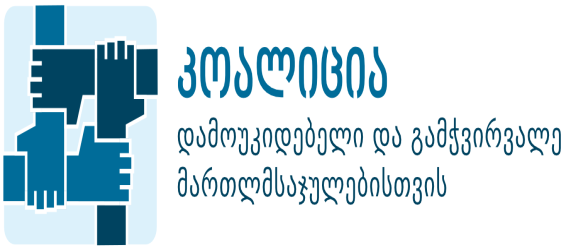
On September 18, 2015 the Parliament of Georgia adopted the draft amendments to the Law on the Prosecutor’s Office on the third reading. The amendments constitute the reform of the Prosecutor’s Office which according to the Government of Georgia. The Coalition for an Independent and Transparent Judiciary got engaged in this process by publishing opinions on the draft law. In its commentary the Coalition stressed that establishing a new rule for the selection/appointment and dismissal of Prosecutor General is not sufficient for the reform of the Prosecutor’s Office. The Coalition also criticized the initial draft amendments, which did not guarantee depoliticization of the selection process. Later, the Venice Commission developed a similar opinion, which stated that despite a generally positive direction of the process of reform, the draft law submitted for consideration did not provide guarantees for full depoliticization of the Prosecutor’s Office. It needs to be stated once more that the Government did not adequately justify the lack of will and readiness for constitutional changes in this context.
The Coalition’s position on the version of the draft adopted on the third reading is that despite certain positive changes, the goal of the draft law – to depoliticize the system – has not been achieved, because despite the Venice Commission opinion the presented changes are fragmental and are not concerned with major principles which in the future shall ensure effective independence of the Prosecutor’s Office. In particular:
- According to the Venice Commission’s and the Coalition’s commentaries, depoilticization of the process of selection/appointment of Prosecutor General requires procedures which would avoid appointment of a candidate acceptable solely to the ruling party. According to the Venice Commission’s recommendation, the law shall establish a procedure which would ensure a merit -based process driven by a consensus of the ruling and opposition parties, representatives of professional circles and the society.
According to the adopted draft law, the Parliament approves a candidate by a simple majority vote, which a ruling party can ensure. This power is not balanced by the selection process, which takes place at Prosecutorial Council, since the adopted draft law allows for the selection of a candidate acceptable solely to the ruling party.
- According to the draft law, Minister of Justice leads the Prosecutorial Council and is unilaterally authorized to nominate candidates. He/she also holds important powers in relation to the Prosecutorial Council.
- The draft law does not establish clear qualification/professional criteria, which a successful candidate shall meet. Thus the Prosecutorial Council is constrained by Minister of Justice’s unilateral decision. The revised version establishes minimal qualification/professional experience requirements. However, these criteria are not sufficient for ensuring a merit-based process. In the absence of such a process the risk of politically biased decisions in the process of nomination by Minister of Justice increases.
- The revised draft has considered the Venice Commission’s Recommendation according to which Minister of Justice is obliged to present several candidates to the Council. However, this recommendation had to be considered in combination with other recommendations instead of being adopted in a fragmentary way. Instead of clear and objective criteria, the draft obliged Minister of Justice to nominate candidates based on the consultation with the public. However, the draft law does not specify which rules and procedures shall guide the public consultations. Can Minister nominate candidates, which have not been considered in the process of consultations? How shall he/she justify a nomination? What needs to be emphasized? The Coalition believes that clear and objective criteria are needed regardless whether or not a Minister has consulted with the society and has justified her submission. This issue is particularly problematic because Minister has a unilateral power of initial nomination of a candidate.
- Prosecutor General’s effective independence largely rests on the rules governing his/her pre-term dismissal. The revised draft law is systematically flawed. The problematic issues include excessively politicized dismissal procedures, a flawed mechanism for the selection and appointment of Interim Prosecutor General who participates in this process, ambiguities related to how he/she deals with a case, insufficient guarantees of Prosecutor General, and complete exclusion of the court from this process. The disciplinary proceedings related to the Prosecutor General are also vague. More detailed considerations on this topic can be found in the Coalition’s public statement.
The Coalition for an Independent and Transparent Judiciary will monitor the process of selection/appointment of Prosecutor General according to the new rules. It will also assess the process of composition of Prosecutorial Council and the selection of Prosecutor General by the Parliament. The findings of these assessments will be publicized.

